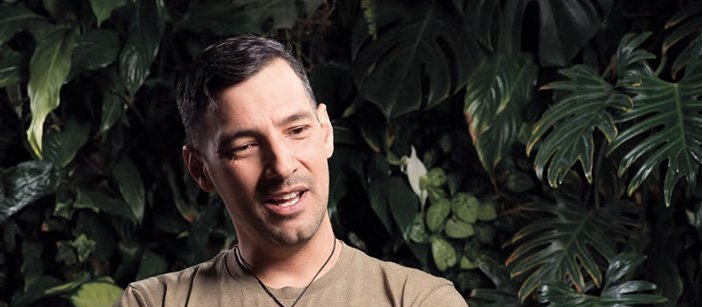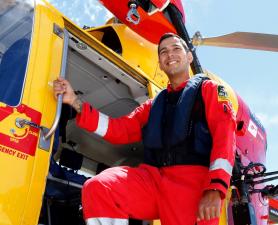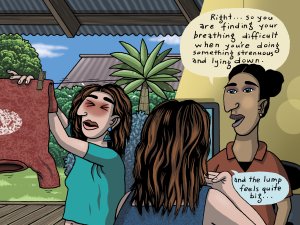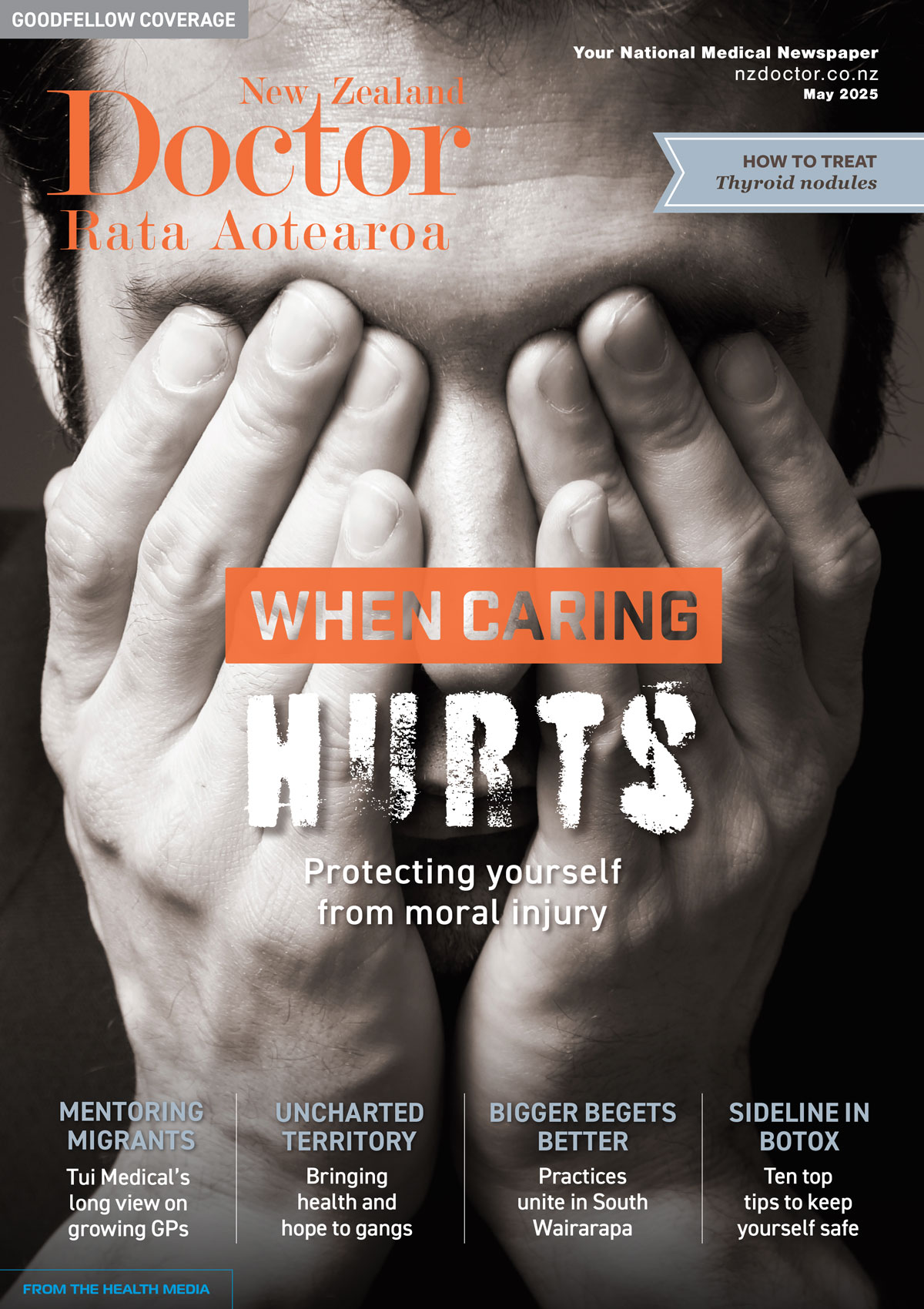Otolaryngologist, head and neck surgeon Francis T. Hall discusses the evaluation of thyroid nodules, which primarily aims to determine the likelihood of malignancy. He then reviews the treatment of thyroid nodules and thyroid cancer, including recent advances in management
Scholarship award provides a ‘breather' for doctor-in-training Carlton Irving
Scholarship award provides a ‘breather' for doctor-in-training Carlton Irving

“It’s really exciting to see mobile services become the norm now”
Clocking up 80 to 100 hours a week while caring for six children means getting through medical school is like running a marathon at sprint pace, says paramedic and medical student Carlton Irving.
But after receiving the Māori Health Leadership scholarship from New Zealand Health Group last week, Mr Irving (Whakatōhea) is hopeful this is set to change in 2022, with less time spent working and more time with his young family.
The registered paramedic, who works for Search and Rescue services, has just finished his third year at the Otago Medical School, where he also teaches te reo Māori.
He chairs the Paramedic Council, newly created in 2020, as well as being a father of six, including a six-week-old and a three-year-old.
He says the scholarship will provide a bit of “a breather” financially. As a mature student aged over 40, he is not eligible for financial assistance, such as a student allowance, from Study Link.
For the past three years, he says he has been working two or three part-time jobs to pay his way through medical school and “it’s been pretty full on”.
Not many medical students shoulder the extra responsibilities of parenthood at the same time as undertaking the “marathon” of medical school.
“When you have a young family, it’s a marathon, but at a sprinting pace.”
He adds he was lucky to also receive the Here For Good scholarship from the Medical Assurance Society in 2020, which awards $1000 to students who actively contribute to a group or community programme for the benefit of others.
The Hiwa-i-te-rangi Māori Health Leadership scholarship is awarded annually, and recognises aspiring Māori leaders who are committed to achieving health equity.
Mr Irving was one of four recipients, receiving a quarter of $20,000.
Fellow recipients include nurse-in-training Aroha Hiraka from Whakatāne who plans to work in Kawerau after graduating, with a long-term goal of running a nurse practitioner-led clinic; registered nurse Cora Waipo who works with Māori and hopes to complete her master of nursing next year; and Tiani Rawiri, who hopes to work in forensic mental health after graduating.
For Mr Irving the new year brings with it another term as chair of the Paramedic Council and starting the clinical stage of his medical school training.
He says he’s “hot” on rural health and will continue advocating for equity of health service delivery for rural communities, as well working on the Paramedicine Standards and registration pathways, looking at cultural safety and competency, and at interprofessional development.
“These are all high on the hit list for next year, aside from being a dad, training to be a doctor and my current job.”
Mr Irving is involved in community initiatives in Ōpōtiki, including pop-up portable COVID clinics, training remote iwi in how to stabilise patients until help arrives, as well as establishing a charity Ngā Ringa Ngaio Whakaora, to support rural Māori into health careers.
He says that while the scholarship award recognises he puts in the hard mahi, “so do others”.
“None of these projects I’m involved in are me, they are all ‘we’. While I push forward for change, I am not alone, I have a lot of friends and colleagues in the fight with me.”
For example, the rise of mobile healthcare in response to the COVID-19 pandemic: “It’s really exciting to see mobile services become the norm now. We were pitching it during the first lockdown but it was too outside the box, but now it’s everywhere.”
Most of all, Mr Irving says the many roles he performs, and projects he undertakes, would not be possible without the support of his wife, who has suffered many hours alongside him, “for free”.
When asked if he has the potential for a bit of a break over Christmas, Mr Irving laughs.
With his third year of study all wrapped up, he is back in his home town, Ōpōtiki, where he’ll be working on the rescue helicopters.
“So it’ll be a productive time - it’s good to come home and help my whānau.”
Mr Irving says he is keeping an open mind about where his medical career will take him after graduating in another three years time, but adds that he is hopeful to continue contributing to prehospital care and improving outcomes for vulnerable communities.
“How that comes together I’m sure will reveal itself in time”.
We've published this article as a FREE READ so it can be read and shared more widely. Please support us and our journalism – subscribe here





![New Zealand Doctor Rata Aotearoa editor Barbara Fountain, RNZCGP president elect and Tauranga-based specialist GP Luke Bradford, Ministry of Health clinical chief advisor rural health Helen MacGregor, and Health New Zealand Te Whatu Ora clinical director primary and community care Sarah Clarke [Image: NZD]](/sites/default/files/styles/thumbnail_cropped_100/public/2025-05/1.%20Barbara%20Fountain%2C%20Luke%20Bradford%2C%20Helen%20MacGregor%20and%20Sarah%20Clarke.jpg?itok=091NETXI)
![Ngāti Porou Oranga specialist GP Elina Pekansaari and Te Nikau Hospital specialist in general practice and rural hospital medicine David Short [Image: NZD]](/sites/default/files/styles/thumbnail_cropped_100/public/2025-05/2.%20Elina%20Pekansaari%20and%20David%20Short.jpg?itok=h5XfSBVM)
![Locum specialist GP Margriet Dijkstra and OmniHealth regional operations manager (southern) Patricia Morais-Ross [Image: NZD]](/sites/default/files/styles/thumbnail_cropped_100/public/2025-05/3.%20Margriet%20Dijkstra%20and%20Patricia%20Morais-Ross.jpg?itok=jkrtRfJC)
![Golden Bay dairy farmer and dairy industry health and safety doctoral student Deborah Rhodes, and Golden Bay Community Health specialist GP Rachael Cowie [Image: NZD]](/sites/default/files/styles/thumbnail_cropped_100/public/2025-05/4.%20Deborah%20Rhodes%20and%20Rachael%20Cowie.jpg?itok=oM0_GcJc)
![Hauora Taiwhenua clinical director rural health Jeremy Webber, Australian College of Rural and Remote Medicine president Rod Martin and Observa Care director of business operations Deborah Martin, the wife of Dr Martin [Image: NZD]](/sites/default/files/styles/thumbnail_cropped_100/public/2025-05/5.%20Jeremy%20Webber%2C%20Rod%20Martin%20and%20Deborah%20Martin%2C%20the%20wife%20of%20Dr%20Martin.jpg?itok=P_aGmX_H)
![Spark Health chief executive John Macaskill-Smith and client director Bryan Bunz [Image: NZD]](/sites/default/files/styles/thumbnail_cropped_100/public/2025-05/6.%20John%20Macaskill-Smith%20and%20Bryan%20Bunz.jpg?itok=5yJvVZ0I)
![Associate dean (rural) Kyle Eggleton, third-year medical student Roselle Winter, and second-year pharmacy student Alina Khanal, all from the University of Auckland [Image: NZD]](/sites/default/files/styles/thumbnail_cropped_100/public/2025-05/7.%20Kyle%20Eggleton%2C%20Roselle%20Winter%20and%20Alina%20Khanal.jpg?itok=RQLd3TEs)
![Health New Zealand Te Whatu Ora clinical editor and specialist in general practice and rural hospital medicine Anu Shinnamon, and Whakarongorau chief clinical officer Ruth Large [Image: NZD]](/sites/default/files/styles/thumbnail_cropped_100/public/2025-05/8.%20Anu%20Shinnamon%20and%20Ruth%20Large.jpg?itok=i5TMswY9)
![Te Kahu Hauora Practice specialist GP Jane Laver and Ngāti Kahungunu ki Tāmaki-nui-a-Rua chief operations manager Tania Chamberlain [Image: NZD]](/sites/default/files/styles/thumbnail_cropped_100/public/2025-05/9.%20Jane%20Laver%20and%20Tania%20Chamberlain.jpg?itok=jtMklaCZ)